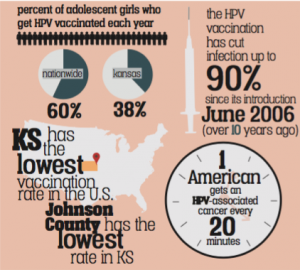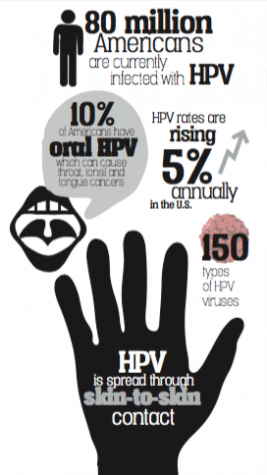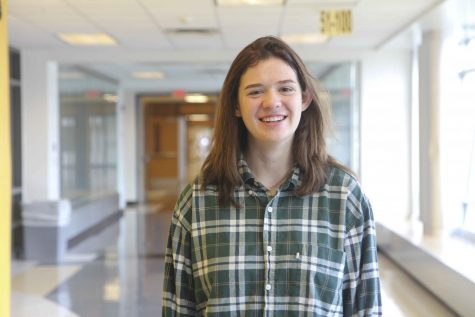The Key to HPV
Kansas boasts lowest HPV vaccination rates in the nation
Currently in the United States, roughly 60 percent of girls ages 11 through 13 are vaccinated with Gardasil — the three-stage human papillomavirus (HPV) vaccination that protects against 90 percent of cervical cancers.
Originally introduced in 2006, this vaccination is still being tested to study long-term side effects and long-term cancer protection.
Despite the vast amount of evidence for the effectiveness of the immunization and the nationwide effort to vaccinate children, Kansas continues to have the lowest HPV vaccination rate — 38.3 percent — among girls in the entire nation, with Johnson County marked as the lowest region in Kansas.
Sources discuss what HPV is, what the Gardasil vaccination prevents and what the community can do to spread awareness and education to get vaccinated.

The ongoing controversy about the HPV vaccination has remained consistent within the past years, with medical professionals arguing if the treatment truly does prevent certain types of cancers.
Kansas has the lowest vaccination rate of any state in the United States. Even worse, the cities of Leawood and Overland Park boast the lowest vaccination rate in the state — our area has one of the lowest vaccination rates in the entire country.

Blue Valley nurse Jen Runyan spoke about why she believes the vaccination rate for this area is so low compared to the rest of the nation.
“I was just reading about that and honestly, I am not sure,” Runyan said. “We are in the heart of the Bible-belt, so that might play a part into it. I think some parents believe they’re saying their child is going to be sexually active [if they get their child vaccinated,] and they don’t believe in that.”
Runyan said another reason why this area’s vaccination rates are low is because of the lack of knowledge about the vaccination.
“Sometimes [people can] get [HPV] confused with HIV,” she said. “There hadn’t been a lot of education about what HPV is and what this vaccine could do for you prior to it being developed and coming out. There is more a lack of education as far as I’ve seen.”

Runyan said the types of cancer this vaccination prevents is well worth receiving the three-step shots.
“It is supposed to help prevent ovarian cancer in women, face and neck cancer in men and other types of cancer,” she said. “It has been said that it is one of the few vaccines you can get that can actually prevent cancer.”
Sophomore Maddie Burns believes vaccines, however, are unnecessary — she only has the required vaccinations to come to school.
“I don’t think you should waste your money on vaccinations if you can’t afford them,” Burns said. “My mom has something against vaccines and shots, and she doesn’t see the point of them. My family doesn’t really get sick, so we’ve never needed them.”
Burns said for the HPV vaccination in particular, she doesn’t believe it should be a required vaccination for students.
“The [HPV vaccination] is [not] something that should be required of people,” Burns said. “I still think parents should have a choice with this vaccine.”
Runyan, however, said she believes the choice is up to the parents, but said she thinks more students should take this vaccine.
“I would recommend students to take it because HPV is so widespread, and it can be sexually transmitted,” she said. “They are recommending 11 to 12 year olds have the vaccine. The reality is that as they get a little older, the numbers of people that are sexually active are large, even if their parents don’t believe they’re sexually active. Because it can be transmitted sexually, boys and girls should both have the series.”


Alli Williams is a co-editor in chief for “The Tiger Print.” She works as an assistant teacher at a math tutoring business. Her favorite part of journalism...



